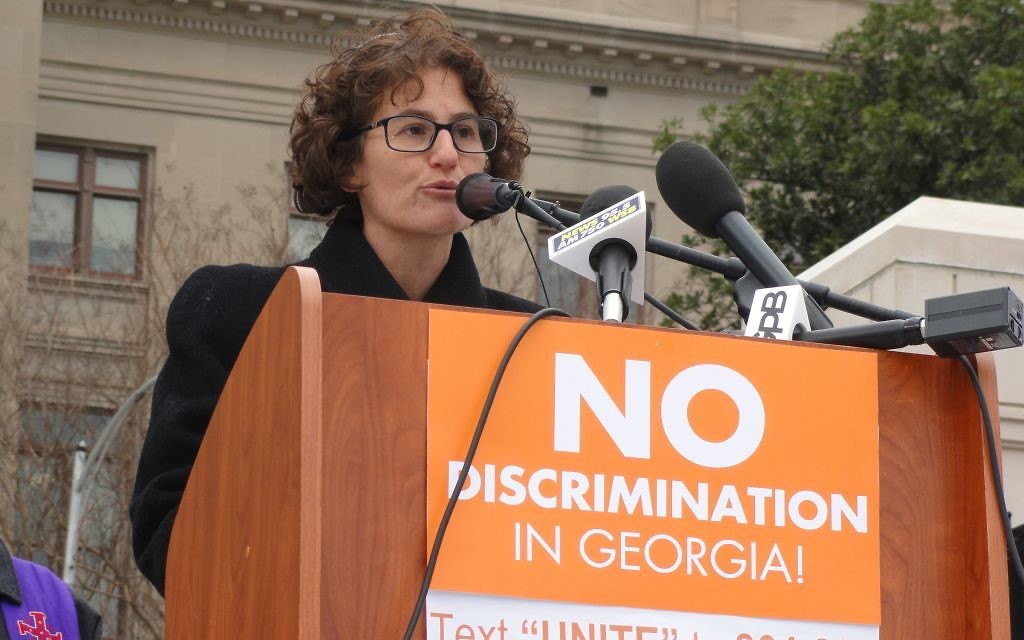Adoption Discrimination Demands Rabbinic Voice
Georgia's SB 375 is a license for bigotry under a religious guise.

Less than a year after my ordination, I accept a job working as a rabbi in a Jewish day school in New York. There is no job description, and the head of school is eager to see how the role develops once school begins.
“I’m not concerned about specific tasks I want you to do,” he says. “Instead, I want you to be.”
Throughout the first 20 years of my rabbinate, I learn that my calling is both educational and pastoral and that school is a comfortable place from which I can foster growth in my community. Having spent time serving from the pulpit, I know how to speak in the prophetic voice of the rabbi but don’t feel particularly called to do so.
Get The AJT Newsletter by email and never miss our top stories Free Sign Up
Until I did.
I was called — literally — by leaders of SOJOURN and Georgia Equality, by community activists and clergy I particularly admire, to stand up against discrimination and to fight for equal protection under the law for LGBT citizens during the 2015 and 2016 legislative sessions.
There were rallies in Liberty Plaza and press conferences on the steps of the Georgia Capitol to oppose the so-called religious freedom laws.
On one occasion, our bipartisan, interfaith, multigenerational coalition delivered dozens of boxes containing thousands of letters to Gov. Nathan Deal’s office, encouraging him to veto a discriminatory law working its way through the legislature to his desk for signature.
There was a bit of a reprieve after the presidential inauguration, and I rested my prophetic voice in 2017 while I marched with others who took the microphone to decry travel bans and deportations. As the 2018 Georgia legislative session progressed, I remained optimistic when House Bill 159, a bill that enjoyed bipartisan support for comprehensive reform of Georgia’s adoption and foster care laws, passed in early February.
But the situation changed when SB 375, the Keep Faith in Adoption and Foster Care Act, was pushed through the Senate Judiciary Committee and sent to a vote with hardly any debate. Lt. Gov. Casey Cagle promised his support of this license to discriminate, despite outspoken opposition by individual constituents and businesses across the state.
For the more than 12,000 children in need of loving families, a law allowing taxpayer-funded agencies to deny service to same-sex couples would be devastating.
My state House representative, Deborah Silcox, assured me in an email that she is “not interested in a bill that discriminates against anyone” and “will vote ‘no’ for SB 375.” Still, I’m going to remind her of her promise, just as I gently remind my students who assure me they will submit assignments after class, while I attend Georgia Equality’s training session and LGBT Lobby Day on Purim, accompanied by a few seniors from the Weber School.
This seems like an appropriate educational activity for the holiday; we will follow in the footsteps of our biblical heroes Esther and Mordechai, who influenced King Achashverosh to enact fair laws regarding the treatment of a vulnerable, minority population under his rule.
After my students and I persuade our lawmakers inside the Capitol building, I’ll cross the street to Central Presbyterian Church to meet my colleagues and friends from all faith traditions at a rally to stop SB 375 from becoming law in Georgia.
I’m prepared to yell — if necessary — in a voice I’d never use with students in my classroom or under the Gold Dome to protest discrimination being perpetrated under the guise of religious values. This is a fight against what our biblical prophets and spiritual leaders would call a desecration of G-d’s name.
My faith demands that we treat orphans, the most vulnerable children among us, with the utmost care. Any person who claims to represent me and seeks to protect my religious freedom will hear me speak my truth in whatever rabbinic voice the situation requires: educational, pastoral or prophetic.
Shema kolenu: Hear our voices cry out on behalf of those whose voices may not be heard.
Rabbi Pamela Jay Gottfried is the dean of Jewish studies at the Weber School and a Rabbis Without Borders fellow.




comments